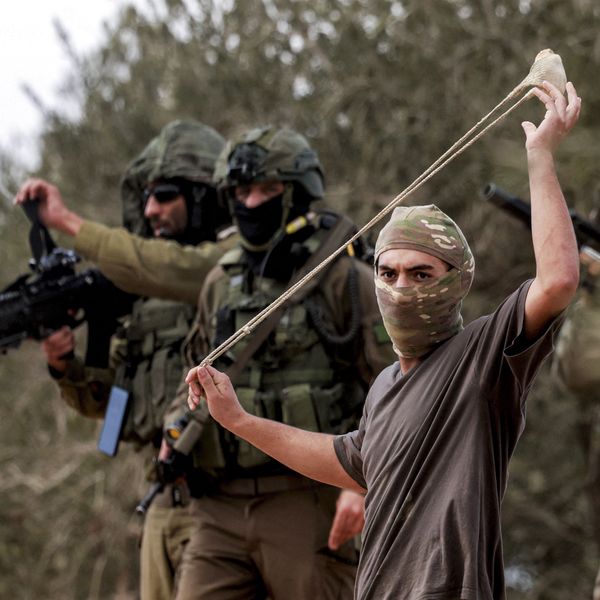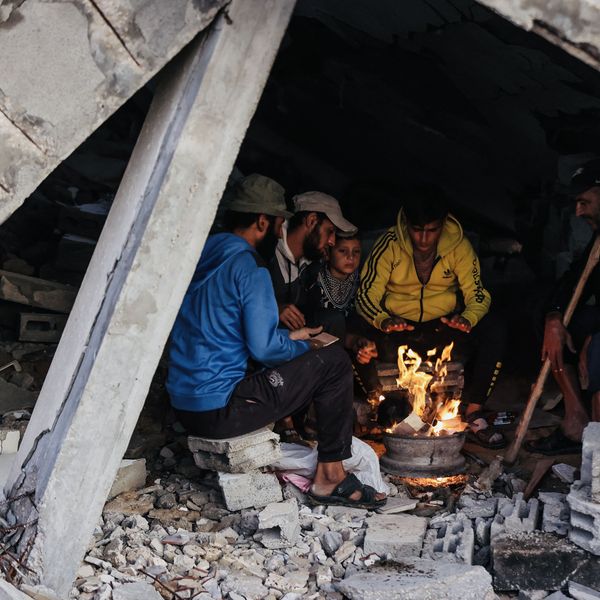Time is running out for Israel. And the
Israeli government knows it. The Jewish Diaspora, especially the young,
has a waning emotional and ideological investment in Israel. The
demographic boom means that Palestinians in Israel and the occupied
territories will soon outnumber Jews. And Israel's increasing status as a
pariah nation means that informal and eventually formal state sanctions
against the country are probably inevitable.
Desperate Israeli politicians, watching
opposition to their apartheid state mount, have proposed a perverted
form of what they term "the one-state solution." It is the latest tool
to thwart a Palestinian state and allow Israel to retain its huge
settlement complexes and land seizures in East Jerusalem and the West
Bank. The idea of a single state was backed by Moshe Arens, a former
defense minister and foreign minister from the Likud Party, in a column
he wrote last month in the newspaper Haaretz asking "Is There Another
Option?" Arens has been joined by several other Israeli politicians
including Knesset Speaker Reuven Rivlin.
The Israeli vision, however, does not
include a state with equal rights for Jewish and Palestinians citizens.
The call for a single state appears to include pushing Gaza into the
unwilling arms of Egypt and incorporating the West Bank and East
Jerusalem into Israel. Palestinians within Israeli-controlled territory,
however, will remain burdened with crippling travel, work and security
restrictions already in place. Palestinians in the occupied territories,
for example, cannot reclaim lost property or acquire Israeli
citizenship, yet watch as Jews born outside of Israel and with no prior
tie to the country become Israeli citizens and receive
government-subsidized housing. Palestinians in the West Bank live in a
series of roughly eight squalid, ringed ghettos and are governed by
military courts. Jews living in the West Bank and East Jerusalem, like
all full Israeli citizens, are subject to Israeli civilian law and
constitutional protection. Palestinians cannot serve in the armed forces
or the security services, while Jewish settlers are issued automatic
weapons and protected by the Israel Defense Force.
If Israel sheds Gaza, which has 1.5 million
Palestinians, the Jewish state will be left with 5.8 million Jews and
3.8 million Arabs. And, at least in the near future, Jews will remain
the majority. This seems to be the main attraction of the plan.
The landscape of the West Bank and East Jerusalem, known as "facts on
the ground," has altered dramatically since I first went to Jerusalem
over two decades ago. Huge fortress-like apartment complexes ring East
Jerusalem and dominate the hillsides in the West Bank. The settler
population is now more than 462,000, with 271,400 living in the West
Bank and East Jerusalem, and 191,000 living in and around Jerusalem. The
settler population has grown at the rate of 4.6 percent per year since
1990 while the Israeli society taken as a whole has grown at 1.5
percent.
The net effect of the Israeli seizure of
land in East Jerusalem, which includes recent approval for an additional
9,000 housing units, and the West Bank is to promulgate a form of
administrative ethnic cleansing. Palestinian families are being pushed
off land they have owned for generations and evicted from their homes by
Israeli authorities. Dozens of families, tossed out of dwellings they
have occupied in East Jerusalem for decades, have been forced onto the
streets. Groups such as Ateret Cohanim,
an ultra-Orthodox Jewish private organization that collects funds from
abroad, purchases Palestinian properties and pursues legal strategies to
evict families that have long resided in East Jerusalem. Israel's
judicial system and police, in violation of international law,
facilitate and enforce these evictions and land seizures.
Heavily armed settlers carry out frequent
unprovoked attacks and ad hoc raids and house evictions to supplement
the terror imposed by the police and military. They are the civilian arm
of the occupation.
"This acquiescence in settler violence is
particularly objectionable from the perspective of international
humanitarian law because the settlers are already unlawfully present in
occupied territory, making it perverse to victimize those who should be
protected-the Palestinians-and offer protection to those who are
lawbreakers-the settlers," said Richard Falk when we spoke a few days
ago. Falk is the U.N. special rapporteur who was denied entry into the occupied territories by the Israeli government.
Falk said that incorporating Palestinians
in East Jerusalem and the West Bank into a single Israeli state would
see Israel impose gradations of citizenship.
"If the Palestinians in pre-'67 Israel
enjoy second-class citizenship, those in the West Bank and East
Jerusalem will be given a third-class citizenship," Falk said. "The real
proposal, the envisioned outcome of this kind of proposal, is an
extension of Israeli control over the occupied territory as a permanent
reality. It is presently a de facto annexation. The creation of a single
state would give the arrangement a more legalistic cover. It would seek
to resolve the issue of occupied territory without the bother of
international negotiations."
"The effect is to fragment the Palestinian
people in such defining ways as to make it almost impossible to envision
the emergence of a viable Palestinian sovereign state," said Falk. "The
longer it continues, the more difficult it is to overcome, and the more
serious are the abridgement of fundamental Palestinian rights."
Falk, who taught international law at
Princeton University, will issue a report to the United Nations this
fall in which he will assert that the Israeli process of colonialism and
apartheid has accelerated over the past three years. He will call in
the report for the U.N. to consider unilaterally declaring Palestine an
independent state, as it did with Kosovo. Falk cites as examples of
Israeli colonialism the official 121 Jewish settlements, as well as
roughly 100 "illegal outposts" in the West Bank, and the extensive
network of roads reserved exclusively for Jews that connects the
settlements to one another and to Israel behind the green line.
He estimates, when "all restrictions on Palestinian control and
development are taken into account," that Israel has effectively seized
38 to 40 percent of the West Bank.
The punishing conditions imposed by the
Israeli blockade of the 1.5 million Palestinians living in Gaza have
been replicated for the roughly 40,000 Palestinians who live in "Area
C," the 60 percent of the West Bank that remains under complete Israeli
military control. Save the Children, UK (STCUK), in a recent report
called "Life on the Edge"
argues that Israeli policies of land confiscation, expanding
settlements, lack of basic services such as food, water, shelter and
medical clinics are at "a crisis point." The report concludes that food
security problems are even worse than in Gaza. According to the
report, "[s]eventy-nine percent of communities surveyed recently don't
have enough nutritious food; this is higher than in blockaded Gaza where
the rate is 61 percent." Palestinian children growing up in Area C
experience, according to the report, malnutrition and stunted growth at
double the level of children in Gaza. Forty-four percent of these
children were found to suffer from diarrhea, often with lethal effects.
STCUK writes that "Israel's restrictions on Palestinian access to and
development of agricultural land-in an area where almost all families
are herders-mean that thousands of children are going hungry and are
vulnerable to killer illnesses like diarrhea and pneumonia."
"Children are being forced to cross
settlement areas and risk beatings and harassment by settlers, or walk
for hours, just to get to school ... many children are losing hope in
the future," Jihad al-Shommali of the Defense for Children International
Palestine Section was recently quoted as saying with reference to the
problems of children in Area C.
Falk said, "This overall pattern suggests
systematic violations by Israel of Article 55 of Geneva IV and Article
69 of the First Geneva Protocol of 1977 that delimits Israel's
obligations to ensure adequate provision of the basic needs of people
living under its occupation, especially in Area C where it exercises
undivided control."
The annexation of Palestinian territory has been reinforced by the
construction of 85 percent of the separation wall-256 of a planned 435
miles has been completed-on occupied Palestinian territory. The barrier
cuts the West Bank off from Israel and has been built in a configuration
which plunges deep into the West Bank. The settlements and the land to
the west of the wall, which makes up 9.4 percent of the West Bank, have
already been absorbed into Israel. The seizure of nearly 40 percent of
the West Bank includes Israeli control of most of the Palestinians'
water supply. The Jewish settlers in the West Bank are allotted per
capita four to five times the amount of water allotted to Palestinians
by the Israeli government.
The settlements in East Jerusalem and the
West Bank violate Article 49(6) of Geneva IV, which prohibits the
transfer of the population of an occupying power to the territory
temporarily occupied. Israel's stubborn rejection of the demand of
Security Council Resolution 242 that it withdraw from Palestinian
territories it occupied in 1967 creates, as Falk said, "a background
that resembles, and in some dimensions exceeds, in important respects
the situation confronting the government of Kosovo."
"Lengthy negotiations have not resolved the
issue of the status of Palestine, nor do they give any reasonable
prospect that any resolution by negotiation or unilateral withdrawal
will soon occur," he said. "Under these circumstances, it would seem
that one option available to the Palestine Liberation Organization [the
Oslo Agreement empowered the PLO to negotiate international status
issues] acting on its own or by way of the Palestinian Authority under
international law would be to issue a unilateral declaration of status,
seeking independence, diplomatic recognition and membership in the
United Nations. The recent Kosovo advisory opinion of the World Court in
The Hague provides a well-reasoned legal precedent for such an option."


